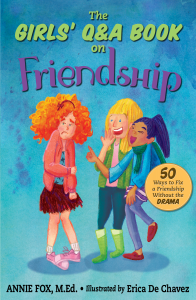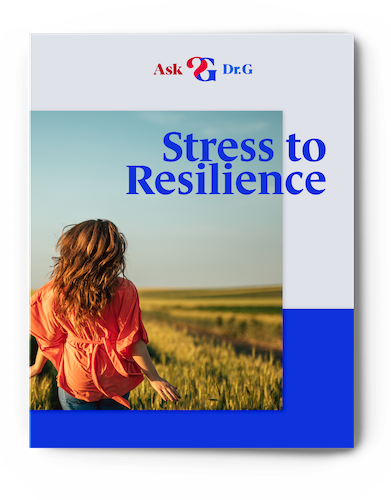 Got Friendship Drama?
Got Friendship Drama?
Today I bring you incredible help! Annie Fox, M Ed, kids and teen relationship expert! She has this fantastic new book out, The Girls’ Q&A Book on Friendship. And she kindly offered to answer four of your questions about your daughters’ friend challenges. Can someone at your home relate to any of these? I’m betting yes! Thanks, Annie, sincerely! And thank you to the parents who submitted these questions on my Facebook page. Think these answers are helpful? Buy the book!
1. How to navigate the three-friend paradigm?
Annie: If all three friends get along, great. But that’s rarely the case, which is why this problem is so common. Typically kids pair up. If a third child comes into the picture the dynamic changes. Sometimes the tight pair won’t let a newcomer in. And sometimes the newcomer bonds with one of the original pair and an old friend suddenly feels left out. If your child is the one on the outside looking in, please empathize. It can be hurtful to feel like an outsider, especially if your child once had a really close relationship with one of the other children. If the three kids don’t seem to be able to get along together, then suggest that your child set up time, outside of school, to be with one of the other two kids. That can help reinforce the strength of a friendship. And during school time, you might want to encourage your child to find a new buddy.
2. How do you teach young girls (in our case, 10), how to set boundaries? One friend who’s also a classmate says things to her that undermine her confidence (“everyone knows your writing sucks”) but then laughs it off as a joke; a couple other friends always look to her and want to do what she does and they are very sweet and good to her, but too clingy. I’ve taught her about “poop sandwiches” (sandwich the not-as-nice thing you need to say in between 2 nicer things) but it’s just not working. Are there phrases she could use to help her tell the bitchy chick to change or go away, and to tell the lovely friends to be more independent?
Annie: Setting boundaries is something we all have to learn, because, after all, we teach people how we want to be treated. When we stay silent in the face of insults, (or worse, if we laugh along with the people mocking us) then we send this message: “It’s OK for you to put me down.” Since that’s not the message your daughter wants to send, she needs to speak up for herself. If, for example, Friend A makes nasty comments and then hides behind “Just kidding!” your daughter needs to gain the confidence to let Friend A know she just “crossed the line.” She might say something like this, “That didn’t feel like ‘kidding’ to me. It hurt. If you’re really my friend, you won’t do that again.” Now Friend A has been put on notice and your daughter has taken back her power. If your daughter needs help saying these words, do some role play with her until she feels ready to talk to Friend A. Please remember, this isn’t a “confrontation.” Advise your daughter to stay calm, make eye-contact, and simply speak the truth. Hopefully this will work. If Friend A continues to make cutting remarks, then your daughter will have to continue standing up for herself. She might also have to talk with the teacher about this classmate.
In the case of Friend B who is “too clingy”… that’s a bit trickier. Your daughter has the right to choose who she spends time with but she doesn’t have the right to ever intentionally hurt anyone. She might say something like this, “I like spending some time with you but not ALL the time. I want to spend time with other friends too. So today, I’ll be with you during lunch recess, but tomorrow I’m going to hang out with Friend C.” That’s a clear communication and it’s respectful. Friend B may not be happy to hear that she won’t get to be with your daughter tomorrow, but if your daughter stays calm and clear about the message (“I want to spend some time with you but not ALL of my time.) then Friend B will (eventually) figure out that she needs to widen her friendship circle.
3. I always feel honesty is the best policy when discussing issues with a friend. Can being honest like that hurt the friendship? It’s just I will always give my honest opinion!
Annie: People often use their “honest opinion” as an excuse to treat other people carelessly. When we talk to people about “issues” the key to effective communication is in the intention behind our words. Honesty builds trust in a relationship. But no matter how well-chosen your honest words are, if you come to a conversation ready to do battle, and your intention is to hurt your friend, put her down, embarrass, hurt or in anyway make her feel “less than” then she will feel the intention rather than hear your words, no matter how honest you are being.
Before you enter into another discussion of issues with a friend, I suggest that you ask yourself, “What am I after?” In other words, what is the goal of this discussion? Are you, for example, hell-bent on changing your friend’s behavior or her opinion or something or someone? Or are you truly interested in hearing what she has to say and gaining greater understanding of where she stands? When we come from the latter place rather than the former, we’re less likely to hurt people and damage relationships. In fact, when we communicate with an open mind and heart, we are more likely to strengthen relationships.
4. My daughter wants to be friends with boys and girls, but lately she is getting a lot of pressure to stay away from the boys. The boys she enjoys are great, but the girls are saying things like “Why would you want to play with them?” It seems they can only imagine that my daughter is “gay” – do they even know what that means? – “hates girls” or is “in looooovvvveeee with” one of the boys.
Annie: Sometimes girls make things difficult for other girls who don’t conform to The Group’s notion of how a girl is “supposed to” behavior. Boys do the same thing with “non-conforming” boys. But we need to teach our children that there is more than one way to be a girl or a boy.
When girls give your daughter a hard time for playing with the boys, how does your daughter typically respond? If you aren’t sure, please talk to her about it. And while you’re having this conversation, please let your daughter know that she has the right to choose her friends. She also has the right to stand up for herself and she has the moral responsibility to stand up for her friends. For example, if she is challenged with the question, “Why would you want to play with them?” Your daughter could reply by naming a few of the things she admires about these boys. ‘Because they are smart and nice.”
You might have a conversation with the teacher about what’s going on. This seems like a golden teachable moment that shouldn’t be missed!




Comments are closed.